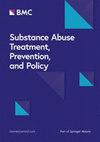2021年至2022年加拿大温哥华吸毒者开始和/或重新开始吸毒:一项前瞻性队列研究。
IF 3
3区 医学
Q2 SUBSTANCE ABUSE
Substance Abuse Treatment, Prevention, and Policy
Pub Date : 2024-09-10
DOI:10.1186/s13011-024-00624-8
引用次数: 0
摘要
目的在 COVID-19 大流行导致医疗服务大面积中断的同时,加拿大温哥华的吸毒者(PWUD)因吸毒过量而死亡的人数急剧增加。众所周知,有注射吸毒史的人受到药物相关伤害的风险更高。自大流行开始以来,对这一人群的毒品使用模式以及相关的社会人口和医疗保健使用趋势的研究一直不足。我们试图了解有注射吸毒史(IVDU)的人群开始和/或重新开始吸毒的模式。研究对象包括在 2021 年 6 月至 2022 年 5 月期间接受过调查的终生有 IVDU 史的参与者。主要结果变量是研究期间开始使用和再次开始使用药物的复合变量,称为药物(再次)开始使用。结果在 1061 名参与者中,基线年龄的中位数为 47 岁,589 人(55.5%)为男性。共有 183 名参与者(17.2%)报告开始和/或重新开始吸食毒品,其中 44 名(4.1%)报告开始吸食新毒品,148 名(14.0%)报告重新开始吸食毒品(9 名参与者对两者均回答 "是")。总体而言,未受管制的兴奋剂(如冰毒和可卡因)是最常见的(再次)开始吸食的毒品类别(n = 101;55.2%),其次是类阿片(n = 74;40.4%)和迷幻剂(n = 36;19.7%)。在多变量分析中,(重新)开始吸毒与最近的 IVDU(调整赔率 [AOR] 2.62,95% 置信区间 [CI] 1.02,6.76)、监禁(AOR 3.36,CI 1.12,10.14)和无法获得戒毒治疗(AOR 4.结论 在 COVID-19 大流行和吸毒过量危机交织影响的时代,近五分之一有 IVDU 史的吸毒者开始使用新毒品和/或重新开始使用以前的毒品。那些报告开始(重新)使用毒品的人表现出更高风险的药物使用行为,并报告难以获得治疗服务。我们的研究结果表明,有必要为这一高风险人群提供更多的资源支持。本文章由计算机程序翻译,如有差异,请以英文原文为准。
Initiation and/or re-initiation of drug use among people who use drugs in Vancouver, Canada from 2021 to 2022: a prospective cohort study.
OBJECTIVES
Widespread health service disruptions resulting from the COVID-19 pandemic coincided with a dramatic increase in overdose deaths among people who use drugs (PWUD) in Vancouver, Canada. Those with a history of injection drug use are known to be at heightened risk of substance-associated harms. Drug use patterns and associated sociodemographic and health care utilization trends have been understudied in this population since the pandemic onset. We sought to understand patterns of drug use initiation and/or re-initiation among people with a history of injection drug use (IVDU).
METHODS
Data were obtained from three harmonized prospective cohort studies of PWUD in Vancouver. Participants with a lifetime history of IVDU who responded to a survey between June 2021 and May 2022 were included. The primary outcome variable was a composite of substance use initiation and re-initiation over the study period, labelled as drug (re)-initiation. A multivariable generalized linear mixed-effects model was used to examine factors associated with self-reported (re)-initiation of substance use over the past six months.
RESULTS
Among 1061 participants, the median age was 47 years at baseline and 589 (55.5%) identified as men. In total, 183 (17.2%) participants reported initiating and/or re-initiating a drug, with 44 (4.1%) reporting new drug initiation and 148 (14.0%) reporting drug re-initiation (9 participants responded 'yes' to both). Overall, unregulated stimulants (e.g., crystal methamphetamine and cocaine) were the most common drug class (re-)initiated (n = 101; 55.2%), followed by opioids (n = 74; 40.4%) and psychedelics (n = 36; 19.7%). In the multivariable analysis, (re-)initiation of drug use was independently associated with recent IVDU (adjusted odds ratio [AOR] 2.62, 95% confidence interval [CI] 1.02, 6.76), incarceration (AOR 3.36, CI 1.12, 10.14) and inability to access addiction treatment (AOR 4.91, 95% CI 1.22, 19.75).
CONCLUSIONS
In an era impacted by the intersecting effects of the COVID-19 pandemic and the overdose crisis, nearly one in five PWUD with a history of IVDU began using a new drug and/or re-started use of a previous drug. Those who reported drug (re-)initiation exhibited riskier substance use behaviours and reported difficulty accessing treatment services. Our findings underscore the need to provide additional resources to support this high-risk population.
求助全文
通过发布文献求助,成功后即可免费获取论文全文。
去求助
来源期刊

Substance Abuse Treatment, Prevention, and Policy
Medicine-Health Policy
CiteScore
5.20
自引率
0.00%
发文量
73
审稿时长
19 weeks
期刊介绍:
Substance Abuse Treatment, Prevention, and Policy is an open access, peer-reviewed journal that encompasses research concerning substance abuse, with a focus on policy issues. The journal aims to provide an environment for the exchange of ideas, new research, consensus papers, and critical reviews, to bridge the established fields that share a mutual goal of reducing the harms from substance use. These fields include: legislation pertaining to substance use; correctional supervision of people with substance use disorder; medical treatment and screening; mental health services; research; and evaluation of substance use disorder programs.
 求助内容:
求助内容: 应助结果提醒方式:
应助结果提醒方式:


